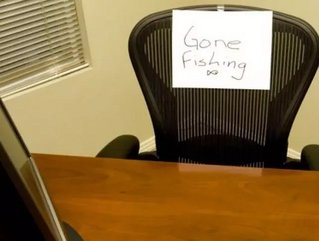Take the Time to Take Time-Off: 3 Reasons to Use Your PTO

According to a recent report published by the U.S. Travel Association following a study conducted by GfK Public Affairs and Corporate Communications, “Americans took the least amount of vacation time in almost four decades [in 2013], forfeiting billions of dollars in compensation.”
We all know how PTO works: You put in a certain number hours with a company and they in turn reward you with a fraction of those hours as “paid time-off.”
However, research shows that an estimated 40 percent of American workers don’t even plan to use the hours they’ve earned in 2014—a far cry from the estimated 80 percent of Americans who actually took a weeklong vacation in the 1970s.
The worst part? According to the report, this seemingly altruistic move was done “without scoring points with their bosses.”
So why are American workers so keen on being “martyrs”? One theory is fear: fear of returning to an overwhelming pile of work; fear of the work not getting done in one’s absence; and, most importantly, fear of being replaced or viewed as replaceable when the company continues without their presence.
Read related content on Business Review USA:
-
Finding the Balance: Don't Let Your Job Ruin Your Life
-
7 Ways Employers Can Reduce Stress in the Workplace
-
Top Ways to Produce Your Productivity at Work
According to Michael Leiter, a psychology professor at Acadia University, “People are afraid if they’re not present and they’re not continually churning stuff out that bad things are going to happen.”
Here are three reasons why you should throw out those fears and take the time to take time-off:
- The Burnout Factor. We’ve all heard the adage “All work and no play makes Jack a dull boy” but that’s not all it does: It also makes for a less effective employee. When we’re tired, our cognitive resources are drained and we cannot perform tasks as easily as when we’re clear-minded and refreshed. In addition, being overworked causes negative feelings towards the company, the job and even bosses or colleagues. Bottom line: We get cranky, and when we’re cranky, we aren't as sharp and we certainly don't enjoy our work. According to the report, 65 percent of respondents believe their concentration and productivity improve after taking time off while another 61 percent report greater satisfaction at work.
- It's Healthy. When it comes to stress, what happens in the workplace doesn’t stay in the workplace. Excessive stress can not only hinder productivity, it can also affect your health. Lack of sleep, poor eating habits and little to no exercise are common traits that go hand-in-hand with overworking, so it’s imperative that we take a break, recharge and refresh. In a study conducted by Expedia, 45 percent of Americans agreed that after taking a vacation, the return to work feeling “rested, rejuvenated, and reconnected to their personal life" while another 35 percent return to work feeling more productive and even better about their job. Positive mood, positive outlook and a positively rested mind.
- You’ve Earned It. As mentioned above, vacation time, or paid time-off, is accumulated—you have to put in work to be able to take off work. So what happens to those hours if unused? Typically they disappear, which is essentially the same as throwing away money. Would you actually take a stack of $20 bills and throw it in a trash can? Doubtful. Why, then, would you mirror that action with unused PTO? As pointed out in the U.S. Travel Association’s report, the average American only used 16 out of 20.9 vacation days in 2013, which may not sound like a large difference until they hit you with this fact: When added up, 169 million days of unused vacation time in the U.S. equated to $52.4 billion in lost benefits. That’s a lot of money in the trash can.
Follow us on Twitter: @BizReviewUSA
Like us on Facebook: /BizReviewUSA
- Five Minutes With: Sarah Robb O'Hagan, CEO at ExosLeadership & Strategy
- Liz Elting – Driving Equality & Building Billion-$ BusinessLeadership & Strategy
- Five Minutes With: Kelly Ahuja, CEO at Versa NetworksLeadership & Strategy
- Have senior leaders lost sight of what motivates employees?Leadership & Strategy






